Jennifer Podemski Shares Insights from 30-Year Career During Inspirational ‘In Conversation’
In This Article
- On the early beginnings of her acting career:
- On getting her acting career started in the 1990s:
- On her disastrous attempt to make a go of it in Hollywood:
- On how anger fuelled her desire to start her own production company:
- On the first show she produced, The Seventh Generation:
- On receiving positive feedback from audiences:
- On how she would advise aspiring young filmmakers to go about approaching prospective mentors:
- On what role she identifies most as, as an actor-writer-director-producer-creator:
- On Indigenous representation in the Canadian film and television industry:
- On her hopes for Little Bird, the new limited series she’s show-running and executive producing for Crave:
- More About Jennifer Podemski:
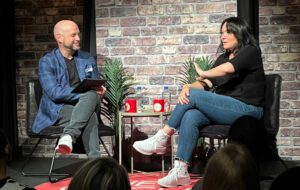
By Cynthia Reason, May 1st, 2023
Toronto Film School recently hosted Jennifer Podemski, the 2023 recipient of the Academy of Canadian Cinema & Television’s Board of Directors Tribute Award, for a special, live “In Conversation” with our President Andrew Barnsley.
Podemski spent the Winter Term mentoring TFS’s Film Production and Acting for Film, TV & the Theatre students for the latest session of the Inner Circle Club program – TFS’s flagship initiative, where an industry insider becomes the school’s expert-in-residence every term, offering exclusive insights, tips, strategies, techniques and more with the TFS community.
Over the course of their 90-minute sit down, Podemski and Barnsley discussed the multi-hyphenate award-winning actor, writer, director and producer’s 30-plus-year career in the Canadian screen industries – from her break-out role in Bruce McDonald’s iconic film, Dance Me Outside, to her current role as CEO of Redcloud Studios Inc., to the upcoming premiere of her limited series, Little Bird.
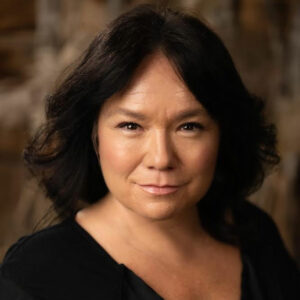
Here are some of the highlights of what Podemski had to say:
On the early beginnings of her acting career:
“I always dreamed of being a performer. I thought that if I could just be on a stage and make people laugh and sing for them, that would be an awesome job. But it always seemed really far away, because everyone I saw on TV was white, so I couldn’t really see myself there…Then the TV show Fame came out and that’s kind of where everything changed for me. I was like ‘Holy crap! I want to go to a school like that!’ I grew up here in Toronto, so I auditioned for Claude Watson School of the Arts, and got in for dance, and that’s sort of where everything just unraveled and unfolded. There were a lot people who did television there; a lot of the Degrassi cast was there. So, it was a good environment to be in to foster that potential.
On getting her acting career started in the 1990s:
I actually started in television as a background performer on Prom Night III when I was in Grade 10. I was a part of the explosion of Indigenous stories in the ’90s that didn’t involve any Indigenous people making them. I was 17 when I got my first job, and so from the age of 17 to 24, I worked consistently as an actor – consistently meaning, like, once a year. So, I was still broke and working full-time jobs and auditioning like crazy. But there was no work for Indigenous actors at all, and what was available was super racist, for the most part. I think I was involved in most of the good stuff, like Dance Me Outside, and then the spin-off, The Rez, and Conspiracy of Silence and The Diviners – stuff I’m really proud of being a part of.
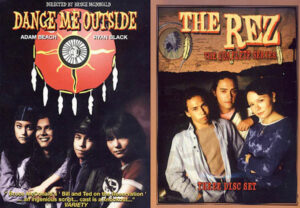
On her disastrous attempt to make a go of it in Hollywood:
I did try L.A., but it went terribly wrong. There was a lot of buzz for me after Dance Me Outside and I had a meeting with someone at William Morris (talent agency), so I was there for 10 days – and every day something went wrong. The first day, I was walking down the street and a car accident happened right beside me. Mary Stuart Masterson got out of the car because she hit someone, and I was just like ‘That’s weird,’ and kept walking. Later that day I went to a really terrible audition for Beverly Hills, 90210, where the costume director wasn’t even looking at me. And when it was over, I had to hitchhike back because my friend just left me there. And then I literally saw a spaceship. I saw a spaceship, but I won’t get into that. I also missed a meeting with Norman Jewison, who did Dance Me Outside, at his house in Malibu, because the person I was staying with never gave me the messages.
Then, when I did finally get to the audition for the William Morris guy, he was, like, ‘I don’t really know what I would ever do with you. You’re not really white, but you’re also not really anything else. You’re kind of skinny, but you’re also kind of big – turn around for me.’ And that kind of stuff. After that, I went down and bawled my eyes out in the lobby of William Morris. And then I tried New York. I think I was standing in line for five hours for an open casting call for something, and I was just like ‘This sucks. I don’t want to do this life. This life sucks.’
On how anger fuelled her desire to start her own production company:
When I was 24, I just decided to quit the business and move to New York, because my sister was there in Rent the musical. I thought maybe if I went to New York, I’d find myself and find my purpose. And it ended up that that exact thing happened. I was working at a gym in New York and I started to manifest how to become a producer and how to never again work as an actor on racist projects that not only erase the true history of Indigenous people, but also reinforce ideas that we are an historic memory and that we don’t exist today. So, I built up a lot of anger – and that’s what fuelled my desire to open a production company. So, I did. I literally just returned to Canada and I opened a production company (Big Soul Productions) out of anger. I think sometimes anger has a way of feeling really amazing. The work itself is out of love, but the impetus that got me there was an angry feeling.
On the first show she produced, The Seventh Generation:
I wanted to make content that celebrated Native people and stories and told the truth about who we are as the collective ‘we.’ So, my first show was called The Seventh Generation, and it was a role model series for APTN (Aboriginal People’s Television Network)…We basically drove across the country and did these episodes on Indigenous people who were doing incredible things in their communities, and it went for three seasons. And that was my first show. I was the host, so I was able to have a job in front of the camera and also produce and direct and write and do all the things. It was a great little show that went completely ignored by the whole industry.
On receiving positive feedback from audiences:
It’s really important for me to receive feedback from community members who have been impacted by something that I’ve done, because most of the stories that I do expose certain truths that I think are important for Canadians to face. So, when I’m sitting on a plane next to a 70-year-old white guy and he says, ‘Oh, I saw you in Empire of Dirt, and that was a great story, and I really want you to know that I vote for supporting Indigenous people, and I vote against colonial violence’ and stuff like that, it means something to me. Reaching just that one person – that’s a success to me.
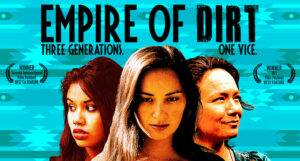
On how she would advise aspiring young filmmakers to go about approaching prospective mentors:
I would say that if you do your research and find the person or people that you want to model your career after, the best way to do it is to just ask them – because I think you would be surprised at how many people would be open to that – like, really open. I do a lot of mentoring, and sometimes someone will call me and be like, ‘You don’t know me, but I really would like you to…’ and depending on if I’m available or not, most of the time, I take it on, because it really is sometimes just a little bit of work for a lot of impact. You don’t realize how much knowledge you have until you’re talking to someone, and you talk them out of a problem. Mentoring is so important. It’s like wisdom. It’s like having your own Yoda – someone to ask for help and wisdom.
On what role she identifies most as, as an actor-writer-director-producer-creator:
I think I would say storyteller, because all of those positions have that in common – that you’re telling a story. But I think – and this is weird and totally disconnected from that question – but I think I’m naturally a clown. I think that’s my true nature. I want to entertain people; I want to make people feel seen. That’s what I want, and clowns do that.
On Indigenous representation in the Canadian film and television industry:
I think we are definitely a good example of television that more accurately reflects society, but there are still major problems. You don’t just see any Indigenous people on TV, unless it’s an Indigenous show or character. We can’t just be. But I think we’re more advanced and socially minded here than in other places, and I think our regulations have helped that. When you’re forced to do something, things change for the better. But I think that my career is a reflection of just how little has changed, because I still can’t walk into a bank with a show and ask for $20 million – and that’s not because I haven’t paid money back before, it’s just that that’s not the way it works. And it just hasn’t changed very much.
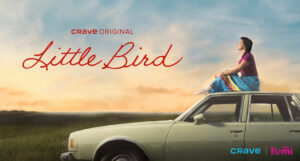
On her hopes for Little Bird, the new limited series she’s show-running and executive producing for Crave:
For Little Bird to be Crave’s first original drama series is definitely a big deal. They put a lot of faith and energy and nurturing into the project – and a lot of trust. And I think that it’s going to set a tone for the future of the things that they’re doing. So I think there’s a lot riding on the show in that way, so I hope people watch it. It’s historical and here’s a lot of new interest that hasn’t been explored before, but it’s also a really beautiful story. It’s a compelling, beautiful story about family and what it means to be a family, and that’s something I think that everybody can relate to. So, I hope that it sees a global audience, and I hope that it touches people in a way that they haven’t experienced before, because these kinds of stories with these kind of characters haven’t been seen really before.
More About Jennifer Podemski:
Born and raised in Toronto, Jennifer Podemski’s professional acting career began when she was 17. Her breakout role was ‘Sadie’ in Bruce McDonald’s iconic film, Dance Me Outside – a performance that garnered critical acclaim, solidifying her place in Canada’s film and television canon.
As a woman of mixed Anishinaabe (First Nation) and Ashkenazi (Jewish) decent, Jennifer decided to shift her focus to producing in 1999 as a way to address the lack of Indigenous representation in the film and television industry. She launched Big Soul Productions with Laura Milliken, becoming Canada’s first Indigenous owned and operated, full-service film and television production and post-production company. Big Soul Productions produced a variety of documentary television series, scripted short films and the award winning, multi-season, all-Indigenous dramatic television series Moccasin Flats for Showcase Television and APTN.
In 2005, Jennifer branched out independently and has been creating, producing, writing and directing content through her production company Redcloud Studios Inc. Her most recent credits include five seasons of the paranormal television series The Other Side (APTN), the award winning feature film Empire of Dirt and two seasons of documentary series Future History (APTN), for which she received the 2020 Canadian Screen Award for Best Director for Factual.
Jennifer has maintained a successful career as an actor, with roles in Degrassi TNG, Republic of Doyle, Take This Waltz, Blackstone, Hard Rock Medical and Cardinal. She is most proud of her starring role in her own film Empire of Dirt which was nominated for five Canadian Screen Awards in 2015 – including Best Supporting Actress and Best Film nods for Jennifer, and a win for Best Screenplay, making Shannon Masters the first Indigenous woman to receive this honour.
In 2020, Jennifer launched The Shine Network, a digital platform designed to amplify the voices of Indigenous women content creators and offer professional development opportunities to Indigenous women.


